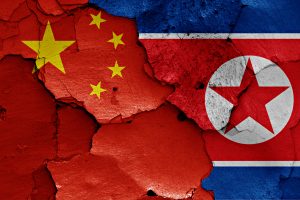Poisonous mushrooms are growing quietly behind the deepening shadow of simultaneous international security crises. The war in Ukraine has continued for nearly two years, and Israel, which suffered civilian casualties from Hamas’ attacks on October 7, is engaging in a thorough revenge war that makes little distinction between civilians and combatants. Both conflicts have caused major waves in international politics and the economy.
However, while the world’s attention was focused on Ukraine and Israel, pre-existing threats in the international community were not resolved but worsened. One of these issues is North Korea’s military provocation.
On the evening of November 21, North Korea launched a military spy satellite. According to the North’s state media, the satellite succeeded in entering orbit. North Korea had previously attempted to launch a spy satellite in August, but the effort failed due to a problem with the rocket engine. Neighboring countries are paying attention to how North Korea solved the problem in three months.
South Korea’s military authorities said Russia provided technical advice after the Russia-North Korea summit in September, including dispatching engineers to North Korea.
Pyongyang’s launch of a spy satellite constitutes a violation of United Nations Security Council sanctions against North Korea. In response, neighboring countries such as South Korea, the United States, and Japan immediately condemned North Korea’s provocative actions. However, China, which has the longest border with North Korea, is silent, ignoring the growing threat.
This contrasts with the past, when the Chinese Foreign Ministry expressed regret over North Korea’s satellite launch in 2012. This time, the ministry’s spokesperson said only that China had “noticed” the satellite launch, then seemed to justify the act by adding, “The Korean Peninsula is in today’s situation for a reason.” With only tacit sympathy emanating from China, North Korea is preparing for another armed provocation.
It has been about a year since North Korea reportedly completed preparations for its seventh nuclear test. In April of this year, General Paul LaCamera, the commander of the U.S. Forces in Korea, stated that the technical preparations for North Korea’s upcoming nuclear test had been completed, and all that remained was a decision from top leader Kim Jong Un. If the North successfully miniaturizes nuclear warheads in the next test, there will be an acceleration not only in its intercontinental ballistic missile (ICBM) development but also in the advancement of tactical nuclear warheads.
North Korea’s willingness to use nuclear weapons has also grown to a worrying level. In September of this year, its nuclear force policy was enacted into law specifying the defensive purposes and the conditions for preemptive nuclear strikes. The law states that a nuclear strike will be automatically initiated if the leadership, including Kim Jong Un, is believed to be in danger. Particularly alarming is the potential use of nuclear weapons due to misperception and misjudgment. This makes the possession of a nuclear arsenal by North Korea, a regime with a closed decision-making structure, a colossal security threat to neighboring countries.
China should be the most vocal about this issue. While the United States aims to thwart Pyongyang’s ICBM development from a homeland defense perspective, China is more likely to suffer the repercussions of North Korea’s development of nuclear weapons. It is time for China to reassess its strategy toward North Korea, given Pyongyang’s maneuver to seek military cooperation with Russia.
Regional powers are keen to eliminate security threats from surrounding forces to establish a security-threat-free zone. However, China has made the strategic error of disregarding Pyongyang’s nuclear development, thereby turning all of Northeast Asia into a danger zone.
The most immediate risk is the exposure of numerous Chinese citizens to radioactive contamination. In 2018, the South Korean government conducted radiation exposure tests on North Korean defectors from Punggye-ri, where the nuclear test site is located. It confirmed genetic mutations in five out of 10 individuals who had been tested. The level of radiation exposure detected in these individuals was significantly higher than the standard threshold for cancer risk.
There have been reports in Hong Kong media that radiation levels have risen in Jilin province in China, which is 70 kilometers away from Punggye-ri. Experts believe that the ground around Punggye-ri may have become significantly weakened after six nuclear tests conducted over the past 25 years, leading to increased radiation leakage.
Looking at the longer term, increasing military tensions in Northeast Asia due to North Korea’s armed provocation will pose an obstacle to China’s cooperation with the international community. The United States will strengthen its massive containment network against the China-Russia-North Korea coalition in the Indo-Pacific region to prevent the military provocations of Pyongyang. China could find itself isolated, with its economic growth engine potentially stalling, especially as NATO’s Asia expansion theory gains momentum and China-U.S. hegemonic competition intensifies.
Already, North Korea’s provocations are having an impact. Seoul and Pyongyang signed the 9.19 Military Agreement in 2018 to stop mutual hostilities and establish a buffer zone. However, on November 22, a day after North Korea launched a military spy satellite, South Korean President Yoon Suk-yeol approved the suspension of the clause forswearing reconnaissance and surveillance activities around the inter-Korean border.
In addition, if nuclear armament proponents gain traction in South Korea and Japan in response to North Korea’s nuclear threat, and a “nuclear domino effect” begins, China will ultimately become the most extraordinary victim. Beijing should acknowledge that Pyongyang has already crossed the red line and take a proactive stance in preventing North Korea’s military threats.

































